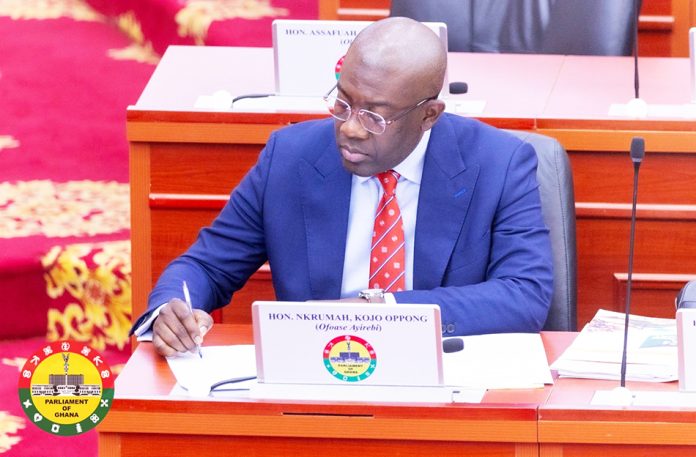The Member of Parliament (MP) for Ofoase Ayirebi, Kojo Oppong Nkrumah, has raised concerns over the sustainability of the Ghana cedi’s recent appreciation, attributing its strength to massive foreign exchange interventions by the Bank of Ghana (BoG).
Speaking on the floor of Parliament during the commemoration of the 60th anniversary of the Ghana cedi, Mr. Oppong Nkrumah said the central bank’s decision to “dump about $1.3 billion onto the market” this month alone explains the currency’s reported 37.4 percent year-to-date appreciation.
He argued that the cedi’s performance is being propped up by temporary market interventions rather than by strong fundamentals or natural demand and supply forces.
“Mr. Speaker, in fact, this month alone, as was mentioned by one of my colleagues, the Bank of Ghana is dumping about $1.3 billion onto the market. That is the reason for the appreciation,” he said.
“If you leave the market to the normal forces of demand and supply for currency without market intervention, will we be getting a 37.4% appreciation? Respectfully, I doubt..,” he asked.
According to the former minister for Works and Housing, the availability of such large foreign exchange reserves is due to the gold purchase programme introduced in 2021, which enabled the Bank of Ghana and the Precious Minerals Marketing Company (PMMC), now the Gold Board, to build reserves by purchasing gold from local producers.
He explained that this policy has increased Ghana’s gold reserves from eight to 30 tonnes, supported by a surge in global gold prices from $1,700 to about $4,000 per ounce, thereby giving the central bank the capacity to inject more forex into the market.
While acknowledging that this intervention has temporarily stabilised the cedi, Mr. Oppong Nkrumah warned that the gains may not last if the government fails to adopt sustainable strategies.
“It is like somebody with a blood pressure problem, who is taking medication to bring his BP down, now claiming all of a sudden that his BP is sorted. The day you stop taking the medication, that’s when you see your smoothness level,” he cautioned.
He stressed the need for a clear framework to guide how much of the forex windfall is released into the market, questioning the long-term consequences of offloading all reserves at once.
“Is it 10 or 15 or 20 or 100 percent of the windfall that we are dumping on the market? And if we dump all of it when it is finished, what will happen?” he queried.
Mr. Oppong Nkrumah urged the government to prioritise measures such as ensuring forex repatriation, reducing dollarisation and preventing banks from holding foreign earnings in offshore accounts.
In response to his comments, the MP for Daboya/Mankarigu, Shaibu Mahama, commended the government for what he described as prudent management that has led to a more stable currency and renewed public confidence in the cedi.
He disclosed that the Gold Board alone had mobilised over $8 billion domestically from January to mid-October this year, with funds now sitting in the coffers of the Bank of Ghana and insisted that the $1.3 billion injected into the market was not borrowed externally.
“The 1.3 billion that was pumped into the system was not borrowed externally. It was mobilised locally. Indeed, from January to October 15th, 2025 the Gold Board alone has raked in over $8 billion,” he said.
Shaibu Mahama further claimed that the cedi’s current trading range of GH¢10 to GH¢12 to the dollar is proof of effective management, contrasting it with past years when the rate hit GH¢17 to the dollar.
“Today, my clients tell me, take my rent in Ghana cedis; don’t go for any dollar from me. People now prefer to use the cedi because of the value it presents,” he added.
For more news, join The Chronicle Newspaper channel on WhatsApp: https://whatsapp.com/channel/0029VbBSs55E50UqNPvSOm2z









